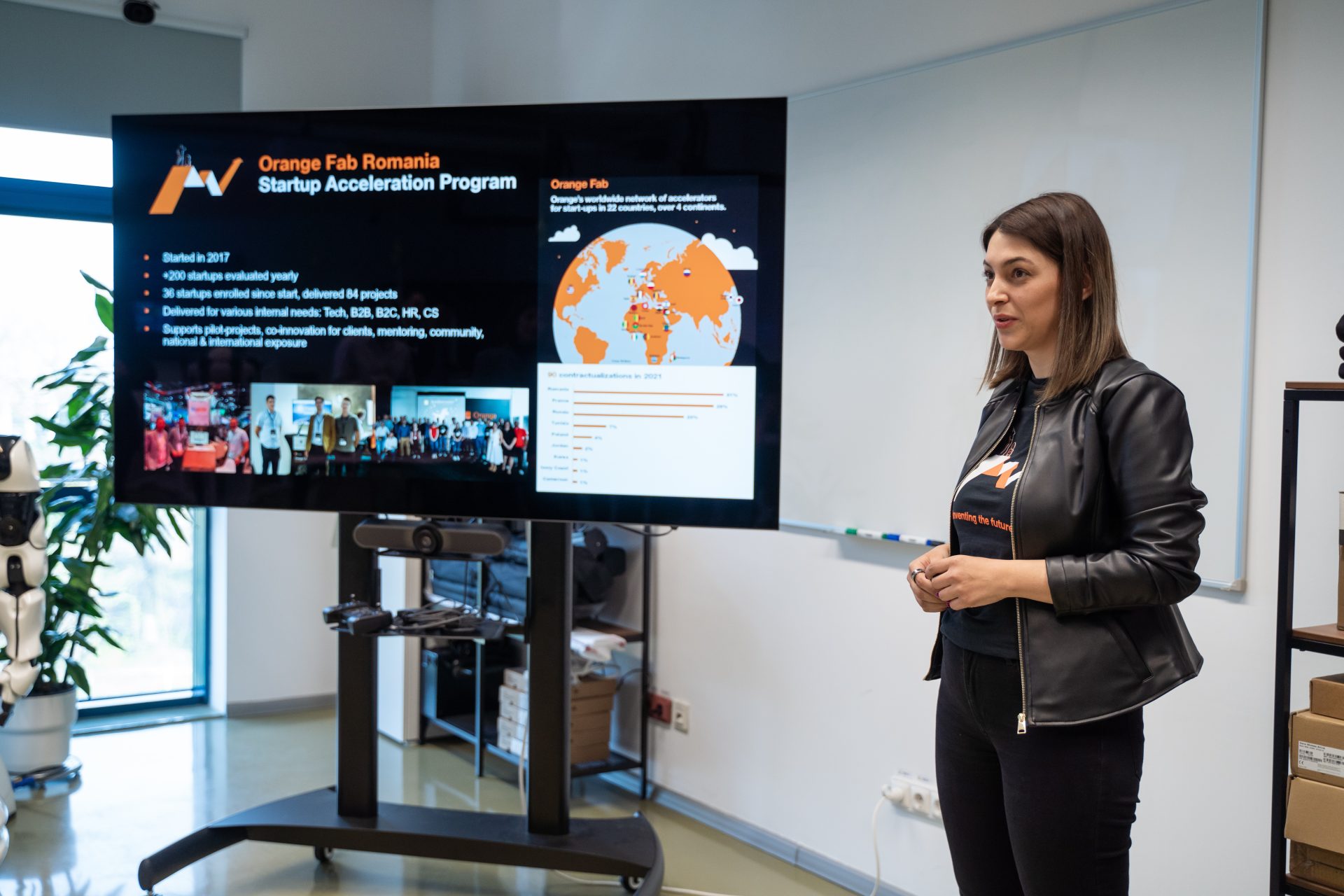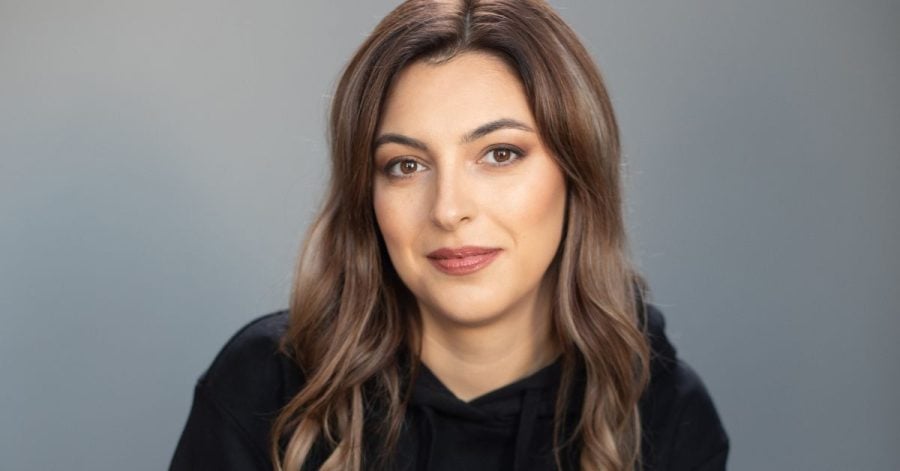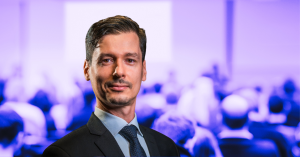With a background in engineering and computer science, Sibiu-born Monica Obogeanu’s journey into the tech startup ecosystem began by attending How to Web in 2011, which she describes as “eye-opening” (# women in tech). Fast forward +10 years, she is the Startups Programs Manager at Orange Fab, the first corporate accelerator in the country.
“Orange Fab was an interesting challenge for me as I understood what startups are going through while bringing me closer to my background and learning more about the technical side,” Monica Obogeanu tells us.
Help yourself so you can support others next
Monica’s professional journey was accelerated when she applied for a job at How to Web, the first Romanian tech startup conference, launched in 2010. They were looking for a blog editor, she wasn’t into software testing, the job keeping her busy at the time, so she booked a one-way ticket to Romania’s capital.
As a Millennial, she sometimes felt the job-hopping itch, but different management responsibilities kept her evolving as a jack of all trades. That is until she became a mother. After her maternity leave ended, she wanted the safety and liberty of the corporate world, as you will discover in the interview below.
This is a story about the importance of seizing opportunities and having the possibility of attending conferences with international speakers. With what goal? Personal evolution, so you can then support the development of communities all around the country.
“Sibiu is focused on automotive when it comes to the people who are graduating from the computer science faculty. So, it’s difficult for a student to get a glimpse of other domains and opportunities,” she shares.

The Recursive: What do you like most about the Orange culture?
Monica Obogeanu, Orange Fab: I like the freedom to experiment. There is a lot of trust in people who proved themselves. There is a culture of cooperation, and that is why we are not micromanaged, and we make procedures as they make sense. It is the kind of job that is both secure and also flexible.
I had this conversation from the beginning with my manager: “I have a two-year-old, and I hear you guys in corporations are strict. If he gets sick, I have no grandparents around, so I am going to have to deal with that,” to which he said: “Yeah, it’s fine. We understand. Almost all of us have kids.”
How would you explain to a 7-year-old what your job is?
I talk to a lot of interesting people and make things happen. I try to understand what they do and match it to what we are doing so it can all fit together.
You have seen the evolution of Romania’s startup industry in the past decade, what can you share about it?
In my view, the ecosystem has been growing since Vladimir Oane. He was the first guy who went through an accelerator and How to Web has always been promoting local role models and brought international expertise. That’s how people in Romania started hearing about accelerators.
Throughout the years, the opportunities to a network have been increasing. But there is still work to be done to reach more people.
What has been new in the past four or five years, is the evolution in other cities besides Bucharest. We started having co-working spaces, and, for example, the guys in Timisoara have launched the Prow Conference. They are bringing international speakers to give a glimpse into how to create your product to a community that is still working a lot in outsourcing.
How has it been developing in your field as a woman? Can you tell us a bit about the challenges?
For many of us, there is a struggle to find our path. But having a technical background, people tend to be more balanced and think structurally.
Looking back to the 15 years since I started working, I got to be a generalist, knowing a bit about many fields. Now, I use this to make parallels and it is quite valuable.
I have been many times the only woman in the room and I got used to that quite fast. I knew I could trust some people even if I was seeing others not trusting me enough. I also had to get used to the fact that I am good at what I do and express my points of view clearly, without keeping myself back.
Respectfully disagreeing with people is something I used to struggle with. But once you learn how to communicate, and say things nicely, it helps. Another challenge was the public appearances. It was not in my nature, so I pushed myself to do it, and it gets easier with time.
What does a day in your life look like?
I have a lot of days when I travel for work. But a typical day starts with my husband taking the kid to kindergarten, which allows me to get to work first thing in the morning, even if I am not an early bird.
At Orange Fab, we have a hybrid working situation. So, sometimes I go to one of the headquarters, and other times to the Orange 5G Lab at Polytechnical University. I travel by Metro, and during this time, I read emails; listen to podcasts, like UPGRADE 100 by Dragos Stanca and “Pe Bune by DOR“; or read the news.
Around 5:30 PM I stop work and pick up my kid from kindergarten. Then, it’s evening time, eating, cartoons, and spending time together, so my husband can get some work done later in the day.
As a young girl, what did you want to be when you grew up?
I went through different phases. I wanted to be a store salesperson, and my first-grade teacher started laughing and said I should aim higher. But I did not have a goal.
I went to a technical university because that was what you did if you were a good student with a mathematical background. I was afraid I wasn’t good, but people encouraged me.
What helped me a lot was the job I had inside the university while attending classes. The most important thing I learned there as an office manager was that I can be good at anything I do. Everything that I tried, even for the first time, I did it well enough so people were happy.
What I always felt was right was helping people. I wanted to feel useful, to prove to myself that I am worth it and that I am doing meaningful things. I know where this comes from – it is a coping mechanism for finding out that I am part of a well-known generation in Romania, where a couple’s second child wasn’t necessarily planned, so we strive to find a purpose in the world.

Do you see a pattern when people come to you for advice?
What I observed is people who are coming from technical backgrounds with no idea about building products. We try to work with researchers in universities doing deep tech. And I have to explain to them that if you want to build a product or service, you have to decide on the user, on how you can sell to them, and this creates an “aha moment”. They need the ABCs of building products, things that are obvious to other people.
What is your definition of success and how do you keep evolving?
Success is the way you feel every day if you are content with what you are doing. Something that I learned after becoming a mother is that it is OK to wish for financial success because money doesn’t bring happiness but it can give you comfort, and that gives you peace of mind.
I have the opportunity to take workshops inside the company on the subjects that interest me, like design thinking. But I learn what I need to do when planning the next project. I am constantly thinking about, for example, how can Orange Fab better serve our organization and the startups.
What do you think makes you good at what you do?
I am good at what I do because I always try to understand where the people I am speaking with come from and what they need to be more successful. This comes with curiosity and a lot of wanting to be useful in helping people. So, I like to read a lot of biographies. Reading about other people’s lives when they look at it in retrospect always gives you ideas on what you can try.
Tell us about how you coped with a mistake or failure in your career. How did you move on?
I don’t see anything that I’ve done as a mistake. Everything happens to teach me something. I used to fight when something was not according to my expectations or was presented to me as being wrong. And then I understood that whenever something feels wrong, there is probably a misunderstanding, and it is way easier to explain your perspective again, asking about the other person’s perspective as well.
If there is a problem, how do we fix it? How do we make sure that it has the least impact that it can have? What do we do so this doesn’t happen the next time?
This gives comfort. It takes you out of being afraid of doing things wrong and keeps you in the concept of discussing with people and focusing on the result.
What is your motivator during not-so-productive days?
A lack of motivation for me signals that I need to rest. You don’t have to expect to do the same amount of work all the time. So, I focus on doing the minimum amount that has to be done to keep things going. I prioritize if other people are waiting for something from me.
From remote work, through automation, a 4-day working week, to universal basic income, how do you imagine the future of work?
In an ideal world, everyone would understand their needs and how they can best work as individuals. I think companies should allow their employees to match this.
This means having the synchronous work that you have to do with a lot of independence. To give this independence to your employees as a company, you must make sure that they know themselves well enough so that they can get organized and you can deliver.







